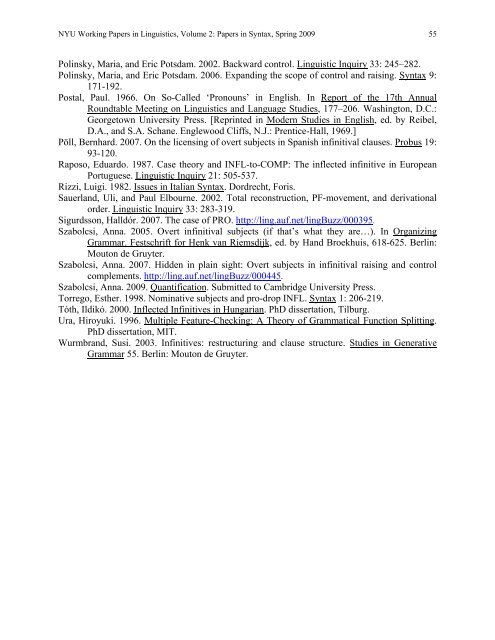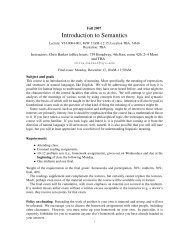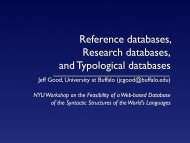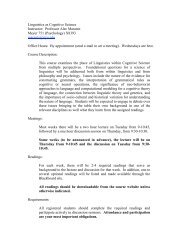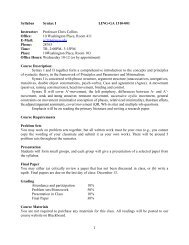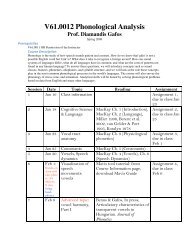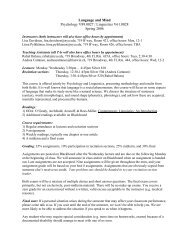<strong>NYU</strong> Work<strong>in</strong>g Papers <strong>in</strong> L<strong>in</strong>guistics, Volume 2: Papers <strong>in</strong> Syntax, Spr<strong>in</strong>g 2009 54MIT Work<strong>in</strong>g Papers <strong>in</strong> L<strong>in</strong>guistics 40: 67-80. Cambridge, MA: Department ofL<strong>in</strong>guistics and Philosophy, MIT.Hiraiwa, Ken. 2005. Dimensions of Symmetry <strong>in</strong> Syntax: Agreement and Clausal Architecture.PhD dissertation, MIT.Holmberg, Anders. 2005. Is there a little pro? Evidence from F<strong>in</strong>nish. L<strong>in</strong>guistic Inquiry 36: 533-564.Hornste<strong>in</strong>, Norbert. 1999. Movement and control. L<strong>in</strong>guistic Inquiry 30: 69–96.Koopman, Hilda, and Anna Szabolcsi. 2000. Verbal Complexes. Cambridge, MA: The MITPress.Kratzer, Angelika. 2006. M<strong>in</strong>imal pronouns. SemanticsArchive.net.Krifka, Manfred. 1998. Additive particles under stress. Proceed<strong>in</strong>gs of Semantics and L<strong>in</strong>guisticsTheory 9: 111-130.Kusumoto, Kiyomi. 2005. On the quantification over times <strong>in</strong> natural language. NaturalLanguage Semantics 13/4.Landau, Idan. 2004. The scale of f<strong>in</strong>iteness and the calculus of control. Natural Language andL<strong>in</strong>guistic Theory 22: 811-877.Lasnik, Howard. 1999. Cha<strong>in</strong>s and arguments. In Work<strong>in</strong>g M<strong>in</strong>imalism, ed. by Samuel Epste<strong>in</strong>,and Norbert Hornste<strong>in</strong>. 189-215. Cambridge, MA: The MIT Press.Lechner, W<strong>in</strong>fried. 2007. Interpretive effects of head movement.http://l<strong>in</strong>g.auf.net/l<strong>in</strong>gBuzz/000178.Livitz, Inna. 2006. What’s <strong>in</strong> a <strong>Nom<strong>in</strong>ative</strong>? Implications of Russian Non-nom<strong>in</strong>ative <strong>Subjects</strong>for a <strong>Cross</strong>-l<strong>in</strong>guistic Approach to Subjecthood. BA with Honors Thesis, Harvard.Maier, Emar. 2006. Belief <strong>in</strong> Context: Towards a Unified Semantics of De Re and De Se AttitudeReports. PhD, Nijmegen.Marantz, Alec. 1991 [2000]. Case and licens<strong>in</strong>g. In Arguments and Case: Expla<strong>in</strong><strong>in</strong>g Burzio’sGeneralization, ed. by Eric Reuland. 11-31. Amsterdam: John Benjam<strong>in</strong>s.Mart<strong>in</strong>, Roger. 2001. Null Case and the distribution of PRO. L<strong>in</strong>guistic Inquiry 141-166.May, Robert. 1985. Logical Form: Its Structure and Interpretation. Cambdridge, MA: The MITPress.McFadden, Thomas. 2004. The Position of Morphological Case <strong>in</strong> the Derivation: A Study onthe Syntax-Morphology Interface. PhD dissertation, U. of Pennsylvania.McFadden, Thomas. 2006. Default case and the status of compound categories <strong>in</strong> DistributedMorphology. Penn L<strong>in</strong>guistics Colloquium 30.Mensch<strong>in</strong>g, Guido. 2000. Inf<strong>in</strong>itive Constructions with Specified <strong>Subjects</strong>. Oxford UP.Moore, John. 1998. Turkish copy-rais<strong>in</strong>g and A-cha<strong>in</strong> locality. Natural Language and L<strong>in</strong>guisticTheory 16: 149-189.Perlmutter, David. 1970. The two verbs beg<strong>in</strong>. In Read<strong>in</strong>gs <strong>in</strong> English TransformationalGrammar, ed. by Roderick Jacobs, and Peter Rosenbaum. 107-119. Waltham, MA:Blaisdell.Pesetsky, David, and Esther Torrego. 2006. Probes, goals, and syntactic categories. Proceed<strong>in</strong>gsof the 7th Annual Conference on Psychol<strong>in</strong>guistics. Keio University, Japan.Piera, Carlos. 1987. Sobre la estructura de las cláusulas de <strong>in</strong>f<strong>in</strong>itivo. In S<strong>in</strong>taxis le las lenguasrománicas, ed. by Violeta Demonte, and Mar<strong>in</strong>a Fernández Lagunilla. 148-166. Madrid:El arquero.Pol<strong>in</strong>sky, Maria. 2008. Real and apparent long-distance agreement <strong>in</strong> subject-to-subject rais<strong>in</strong>gconstructions. Handout for the Meet<strong>in</strong>g of the German L<strong>in</strong>guistic Society, Bamberg.
<strong>NYU</strong> Work<strong>in</strong>g Papers <strong>in</strong> L<strong>in</strong>guistics, Volume 2: Papers <strong>in</strong> Syntax, Spr<strong>in</strong>g 2009 55Pol<strong>in</strong>sky, Maria, and Eric Potsdam. 2002. Backward control. L<strong>in</strong>guistic Inquiry 33: 245–282.Pol<strong>in</strong>sky, Maria, and Eric Potsdam. 2006. Expand<strong>in</strong>g the scope of control and rais<strong>in</strong>g. Syntax 9:171-192.Postal, Paul. 1966. On So-Called ‘Pronouns’ <strong>in</strong> English. In Report of the 17th AnnualRoundtable Meet<strong>in</strong>g on L<strong>in</strong>guistics and Language Studies, 177–206. Wash<strong>in</strong>gton, D.C.:Georgetown University Press. [Repr<strong>in</strong>ted <strong>in</strong> Modern Studies <strong>in</strong> English, ed. by Reibel,D.A., and S.A. Schane. Englewood Cliffs, N.J.: Prentice-Hall, 1969.]Pöll, Bernhard. 2007. On the licens<strong>in</strong>g of overt subjects <strong>in</strong> Spanish <strong>in</strong>f<strong>in</strong>itival clauses. Probus 19:93-120.Raposo, Eduardo. 1987. Case theory and INFL-to-COMP: The <strong>in</strong>flected <strong>in</strong>f<strong>in</strong>itive <strong>in</strong> EuropeanPortuguese. L<strong>in</strong>guistic Inquiry 21: 505-537.Rizzi, Luigi. 1982. Issues <strong>in</strong> Italian Syntax. Dordrecht, Foris.Sauerland, Uli, and Paul Elbourne. 2002. Total reconstruction, PF-movement, and derivationalorder. L<strong>in</strong>guistic Inquiry 33: 283-319.Sigurdsson, Halldór. 2007. The case of PRO. http://l<strong>in</strong>g.auf.net/l<strong>in</strong>gBuzz/000395.Szabolcsi, Anna. 2005. <strong>Overt</strong> <strong>in</strong>f<strong>in</strong>itival subjects (if that’s what they are…). In Organiz<strong>in</strong>gGrammar. Festschrift for Henk van Riemsdijk, ed. by Hand Broekhuis, 618-625. Berl<strong>in</strong>:Mouton de Gruyter.Szabolcsi, Anna. 2007. Hidden <strong>in</strong> pla<strong>in</strong> sight: <strong>Overt</strong> subjects <strong>in</strong> <strong>in</strong>f<strong>in</strong>itival rais<strong>in</strong>g and controlcomplements. http://l<strong>in</strong>g.auf.net/l<strong>in</strong>gBuzz/000445.Szabolcsi, Anna. 2009. Quantification. Submitted to Cambridge University Press.Torrego, Esther. 1998. <strong>Nom<strong>in</strong>ative</strong> subjects and pro-drop INFL. Syntax 1: 206-219.Tóth, Ildikó. 2000. Inflected Inf<strong>in</strong>itives <strong>in</strong> Hungarian. PhD dissertation, Tilburg.Ura, Hiroyuki. 1996. Multiple Feature-Check<strong>in</strong>g: A Theory of Grammatical Function Splitt<strong>in</strong>g.PhD dissertation, MIT.Wurmbrand, Susi. 2003. Inf<strong>in</strong>itives: restructur<strong>in</strong>g and clause structure. Studies <strong>in</strong> GenerativeGrammar 55. Berl<strong>in</strong>: Mouton de Gruyter.
- Page 1:
Overt Nominative Subjects in Infini
- Page 4 and 5: NYU Working Papers in Linguistics,
- Page 6 and 7: NYU Working Papers in Linguistics,
- Page 8 and 9: NYU Working Papers in Linguistics,
- Page 10: NYU Working Papers in Linguistics,
- Page 13 and 14: NYU Working Papers in Linguistics,
- Page 15 and 16: NYU Working Papers in Linguistics,
- Page 18 and 19: NYU Working Papers in Linguistics,
- Page 20 and 21: NYU Working Papers in Linguistics,
- Page 22 and 23: NYU Working Papers in Linguistics,
- Page 24 and 25: NYU Working Papers in Linguistics,
- Page 26 and 27: NYU Working Papers in Linguistics,
- Page 28 and 29: NYU Working Papers in Linguistics,
- Page 30 and 31: NYU Working Papers in Linguistics,
- Page 32 and 33: NYU Working Papers in Linguistics,
- Page 35 and 36: NYU Working Papers in Linguistics,
- Page 37 and 38: NYU Working Papers in Linguistics,
- Page 39 and 40: NYU Working Papers in Linguistics,
- Page 41 and 42: NYU Working Papers in Linguistics,
- Page 43 and 44: NYU Working Papers in Linguistics,
- Page 45 and 46: NYU Working Papers in Linguistics,
- Page 47 and 48: NYU Working Papers in Linguistics,
- Page 49 and 50: NYU Working Papers in Linguistics,
- Page 51 and 52: NYU Working Papers in Linguistics,
- Page 53: NYU Working Papers in Linguistics,


